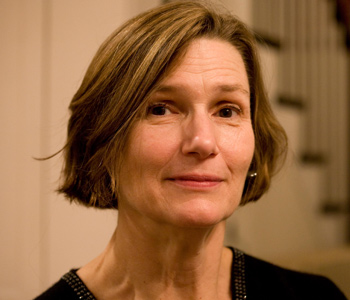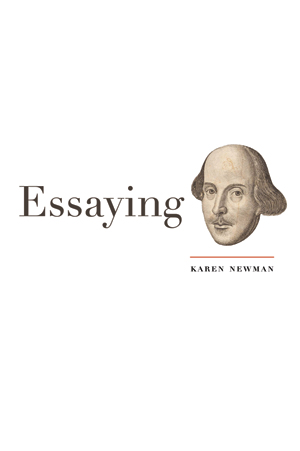
Essaying Shakespeare, as its title suggests, is a collection of essays about Shakespeare.
To” essay” means both to try or attempt, and to put to the test. Written and published over the past 25 years, during an intensely productive period for Shakespeare studies, these essays “try” or “test” major approaches to Shakespeare and literary studies more generally.
Psychoanalysis, new historicism, gender studies, post-structuralism, cultural studies, critical race theory, the history of sexuality, English nationalism and colonial expansion, visual culture, print culture, and the appropriation of and globalization of Shakespeare all echo through the volume. Not only do the essays collected here illustrate recent topics and critical approaches, they are also in conversation with the work of many scholars writing on Shakespeare. And they also engage major thinkers of the twentieth century including Adorno, Derrida, Foucault, Freud, and Marx, among others.
My work is concerned particularly with social exchange and the circulation of people and objects in the Renaissance, which has recently come to be called the “early modern period.” In short, Essaying Shakespeare provides an overview of recent work on perhaps the most famous of world writers and signals directions for the future of Shakespeare scholarship and performance.
“My work is concerned particularly with social exchange and the circulation of people and objects in the Renaissance, which has recently come to be called the ‘early modern period.’”
At Berkeley where I did my graduate work in comparative literature in the 1970s, there were no courses on women, or race, or ethnicity. No one read women writers much at all. Gender, which is the social construction of sexual difference, was not yet even considered a category of analysis, much less so ubiquitous a term that it is now the box we check on forms to indicate our biological “sex.”
At Berkeley there was, however, a “Women’s Caucus,” a cross between what was then known as a “consciousness raising group” and an activist political organization working to leverage curricular change. After some years of agitation – this was, after all, Berkeley in the early seventies: the battle over People’s Park took place in the summer of 1969, and much of what we remember as Berkeley in the sixties was actually the decade from 1964–1974 – the Caucus was funded to teach one course annually. We “elected” each year’s instructor.
As hard as it may now seem to imagine in this age of identity politics, teaching a “Renaissance” course taking into account gender or race or even economics, seemed impossible. So when it was my turn, I taught a course I devised called the “Female Protagonist and the Nineteenth-Century Novel.” That course prompted one of my earliest published essays, “Can This Marriage Be Saved: Jane Austen Makes Sense of an Ending.”
The course, and the essay, sought to consider questions both of representation and the failures of representation. What could be represented in print? Were there silences we could plumb by reading attentively? I tried to address the claim, often made by feminist criticism of that time, that the marriages ending Austen’s novels, or Shakespeare’s comedies, represented a “falling off,” a dwindling of the female protagonist into a wife.
With “identity politics” much in the news today around the appointment of Judge Sotomayor to the Supreme Court, this autobiographical anecdote highlights the process of dis-identification which characterized my earliest relation to literary criticism and to the study of gender. Retrospectively it has always seemed significant that my early teaching and scholarship were outside my chosen field—Shakespeare and Renaissance studies.
I went on to teach that Berkeley course in my first year as an assistant professor at Brown. It still seemed inconceivable to teach a Renaissance course concerned with women. But it was the heyday of feminism and feminist criticism, and my new department was eager to offer such a course. As the only woman in the department, I was asked what I might propose. Apparently, being a woman was qualification enough, no matter the field. So I began doing feminist criticism, which characterized some of my earliest work, by way of a chiasmatic process of both identification and dis-identification (a term from rhetoric, chiasmus means reversal in two otherwise parallel phrases, as in Falstaff’s line “I would my means were greater and my waist slenderer”).
Meanwhile what are called the human sciences, particularly via the work of Clifford Geertz and Michel Foucault, had incited the so-called new historicism, a reaction against formalist approaches to literature. In my field, instead of the topical studies, historical context, and history of ideas that had characterized the literary history of earlier generations, “new historicism” studied ideology and relations of power by “reading” texts of all sorts – popular and elite, “historical” and “literary.” An eclectic variety of reading methods were used – associated with the New Criticism, with the great romance philologists Auerbach and Spitzer, and occasionally, with the French school of Derrida and Paul de Man.
Gender didn’t disappear from the critical scene. Instead, gender has been “mainstreamed” as other categories of difference have gained traction in literary studies.
Today my work engages with a new set of problems and issues: the globalization of culture and cultural translation.
I guess I’d direct a browsing reader to my last essay: any writer is always most interested in his or her current work.
A colleague, Margaret Ferguson, observed over twenty years ago that “the historical fate of the British Empire challenges the idea that explaining oneself to literal and figurative foreigners is an unnecessary activity.” I’m interested in how Shakespeare has become both “foreign” (students occasionally ask me for “translations” of his plays and some high schools actually use “No Fear” or “modern” translations) and yet so completely familiar that we quote his plays without even knowing it. How to explain plays written over 400 years ago to “literal and figurative foreigners”? We have all become “foreigners” to Shakespeare.
Cultural translation is an activity to which I am keenly committed, both by training and temperament, as a scholar working in comparative literature, interested in languages, and as a world citizen of culture. Yet I am also a Shakespearean, which seemingly poses a paradox, for Shakespeare is the quintessential national poet.
Shakespeare’s plays are said to articulate Englishness. They have been quoted by generations of British monarchs and statesmen, and by generals in times of war. “Bardolatry” as one scholar has put it, is “a national religion.” The plays are produced regularly throughout both the UK and the US, and over 400 years after Shakespeare’s birth, they remain a staple of the Anglo-American school and university systems. The recent “discovery” of a supposed new portrait of Shakespeare made the front page of the New York Times and caused great excitement because in the new portrait Shakespeare is handsome and well-off rather than the balding, middle-aged man he was until recently. Shakespeare’s First Folio, a large commemorative folio volume of his plays published a few years after his death—is perhaps the most famous book in English—and certainly today one of the most expensive.
But the earliest advertisement for Shakespeare’s first collected works appeared in 1622, in an appendix of English works at the end of a book catalogue in Latin. The catalogue listed the books for sale at the important book fair held every spring and autumn at Frankfort-on-the-Main in what is now Germany, and which is still held today. It contains the entry “Playes, written by M. William Shakespeare, all in one volume, printed by Isaack Iaggard, in. fol. (from the Latin word for leaf: the book was in the form of a full-sized sheet of paper folded only once).
It is astonishing that Shakespeare’s First Folio was first offered for sale not in England, but at a European market, in a supplemental listing of English books to a Latin catalogue for a German book fair. What interests me is that the ad insists that even before there were modern nation states, Shakespeare was always already multilingual and international, an incipient global cultural commodity.
The globalization of culture is often assumed to be a late twentieth-century phenomenon, the result of an expansion and acceleration in the movement and exchange of ideas, commodities and capital over vast distances and porous boundaries. Narratives of cultural imperialism abound about “Americanization” or western cultural hegemony. Yet long before Shakespeare became the British “national poet” famously celebrated “as the patron spirit of world empire on which the sun will never set,” even before, in fact, the famous First Folio saw print in 1623, booksellers were peddling their intellectual property in Shakespeare internationally. Translation, both literal and cultural, allows for the afterlife of Shakespeare by allowing the plays to continue to live in different cultural moments and far flung cultural geographies.
“Even before there were modern nation states, Shakespeare was always already multilingual and international, an incipient global cultural commodity.”
At the end of the introduction to Essaying Shakespeare I write that my ambition for the book is that it will be of interest not only to scholars—Shakespeareans—but also to graduate and undergraduate students, and, perhaps most importantly, to the general reader. But that, dear reader, is for you to decide.


Karen Newman is Professor of English at New York University. She has written widely on Shakespeare and Renaissance letters and culture and is the author of several books including Shakespeare’s Rhetoric of Comic Character (Methuen, 1985), Fashioning Femininity and English Renaissance Drama (Chicago, 1991), Fetal Positions, Individualism, Science, Visuality (Stanford, 1996), Cultural Capitals: Early Modern London and Paris (Princeton, 2007) and Essaying Shakespeare (University of Minnesota Press, 2009). Before coming to NYU, she was University Professor and Professor of Comparative Literature and English at Brown University. She has also taught at Williams College, The Johns Hopkins University and Harvard University. Her current research on cultural translation aims to historicize contemporary claims about the globalization of culture.